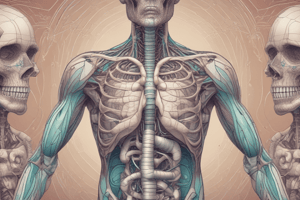Podcast
Questions and Answers
What is the primary function of the respiratory system?
What is the primary function of the respiratory system?
- To produce and regulate hormones in the body
- To bring oxygen into the body and remove carbon dioxide (correct)
- To regulate growth and development
- To maintain homeostasis
Which muscle is primarily used for breathing?
Which muscle is primarily used for breathing?
- Intercostal muscles
- Diaphragm (correct)
- Pituitary gland
- Adrenal glands
What is the function of the hypothalamus in the endocrine system?
What is the function of the hypothalamus in the endocrine system?
- Regulates blood sugar levels
- Regulates body temperature, hunger, and thirst (correct)
- Regulates metabolism
- Regulates growth and development
What is the function of insulin in the endocrine system?
What is the function of insulin in the endocrine system?
What happens during the process of inspiration?
What happens during the process of inspiration?
Which gland is considered the master gland in the endocrine system?
Which gland is considered the master gland in the endocrine system?
Flashcards are hidden until you start studying
Study Notes
Respiratory System
Functions:
- Brings oxygen into the body and removes carbon dioxide
- Regulates pH levels by removing excess hydrogen ions
Organs:
- Nose and mouth: air enters the body
- Pharynx (throat): air passes through to the larynx
- Larynx (voice box): contains vocal cords
- Trachea (windpipe): air passes through to the bronchi
- Bronchi: air passes through to the lungs
- Lungs: exchange of oxygen and carbon dioxide occurs
- Diaphragm: primary muscle used for breathing
- Intercostal muscles: secondary muscles used for breathing
Breathing Process:
- Inspiration: diaphragm contracts, rib cage expands, and air enters the lungs
- Exhalation: diaphragm relaxes, rib cage descends, and air leaves the lungs
Endocrine System
Functions:
- Produces and regulates hormones in the body
- Helps maintain homeostasis
- Regulates growth and development
Glands:
- Pituitary gland: master gland, regulates other glands
- Thyroid gland: regulates metabolism
- Adrenal glands: regulates stress response
- Pancreas: regulates blood sugar levels
- Ovaries (in females) and testes (in males): regulates reproductive functions
- Hypothalamus: regulates body temperature, hunger, and thirst
Hormones:
- Insulin: lowers blood sugar levels
- Glucagon: raises blood sugar levels
- Adrenaline (epinephrine): regulates "fight or flight" response
- Thyroxine (T4): regulates metabolism
- Oxytocin: stimulates uterine contractions during childbirth
- Growth hormone: regulates growth and development
Respiratory System
- Brings oxygen into the body and removes carbon dioxide
- Regulates pH levels by removing excess hydrogen ions
Organs of the Respiratory System
- Nose and mouth: air enters the body
- Pharynx (throat): air passes through to the larynx
- Larynx (voice box): contains vocal cords
- Trachea (windpipe): air passes through to the bronchi
- Bronchi: air passes through to the lungs
- Lungs: exchange of oxygen and carbon dioxide occurs
- Diaphragm: primary muscle used for breathing
- Intercostal muscles: secondary muscles used for breathing
Breathing Process
- Inspiration: diaphragm contracts, rib cage expands, and air enters the lungs
- Exhalation: diaphragm relaxes, rib cage descends, and air leaves the lungs
Endocrine System
- Produces and regulates hormones in the body
- Helps maintain homeostasis
- Regulates growth and development
Glands of the Endocrine System
- Pituitary gland: master gland, regulates other glands
- Thyroid gland: regulates metabolism
- Adrenal glands: regulates stress response
- Pancreas: regulates blood sugar levels
- Ovaries (in females) and testes (in males): regulates reproductive functions
- Hypothalamus: regulates body temperature, hunger, and thirst
Hormones
- Insulin: lowers blood sugar levels
- Glucagon: raises blood sugar levels
- Adrenaline (epinephrine): regulates "fight or flight" response
- Thyroxine (T4): regulates metabolism
- Oxytocin: stimulates uterine contractions during childbirth
- Growth hormone: regulates growth and development
Studying That Suits You
Use AI to generate personalized quizzes and flashcards to suit your learning preferences.



